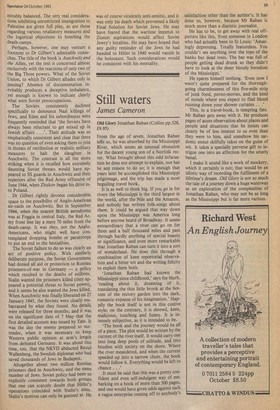Still waters
James Cameron
Old Glory Jonathan Raban (Collins pp.528, £9.95) From the age of seven, Jonathan Raban tells us, he was absorbed by the Mississippi River, which seems an unusual obsession for the decent young son of a Norfolk rector. What brought about this odd infatuation he does not attempt to explain, nor has he any reason to do so; it is enough that years later he accomplished this Mississippi pilgrimage, and the trip has made a most beguiling travel book.
It is as well to think big. If you go in for rivers the Mississippi is the third largest in the world, after the Nile and the Amazon, and nobody has written folk-songs about them. It could be argued that way down upon the Mississippi was America long before anyone heard of Broadway. It seems extraordinary that a river can go on for three and a half thousand miles and pass through hardly anything of special beauty or significance, and even more remarkable that Jonathan Raban can turn it into a sort of wonderland. He does this through a combination of keen reportorial observation and a bitter wit and the writing felicity to exploit them both.
'Jonathan Raban had known the Mississippi since childhood,' says the blurb, 'reading about it, dreaming of it, translating the thin little brook at the bottom of the rectory garden into the dark, romantic expanse of his imagination.' Happily the book itself is not in this costive style; on the contrary, it is shrewd, keen, malicious, touching and funny. It is intensely subjective, as it is intended to be.
'The book and the journey would be all of a piece. The plot would be written by the current of the river itself. It would carry one into long deep pools of solitude, and into brushes with society on the shore. Where the river meandered, and when the current speeded up into a narrow chute, the book would follow it. Everything would be left to chance. .
It must be said that this was a pretty confident and even self-indulgent way of embarking on a book of more than 500 pages, and one would have given odds against such a vague enterprise coming off to anybody's satisfaction other than the author's. It has done so, however, because Mr Raban is much more than a diaristic journalist.
He has to be, to get away with real offputters like this, from someone in London who had actually been to St Louis: 'Amazingly depressing. Totally featureless. You couldn't see anything over the tops of the banks but dead trees. The bar was full of people getting dead drunk so they didn't have to look at the sheer bloody boredom of the Mississippi.'
He spares himself nothing. 'Even now I wasn't quite prepared for the thoroughgoing charmlessness of this five-mile strip of junk food, porno-movies, and the kind of motels where you expect to find blood running down your shower curtains . .
This, in a travel-book, is tempting fate. Mr Raban gets away with it. He produces pages of acute observation about places and people and situations that he insists can clearly be of less interest to us even than they were to him, and somehow his sardonic ennui skilfully takes on the guise of wit. It takes a specially perverse gift to intrigue one into an affection for the utterly banal.
I make it sound like a work of mockery, which it certainly is not; that would be an idiotic way of recording the fulfilment of a lifetime's dream. Old Glory is not so much the tale of a journey down a huge waterway as an exploration of the complexities of Jonathan Raban, who may not be as long as the Mississippi but is far more various.


































 Previous page
Previous page